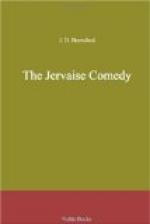And it was with the idea of seeing what inferences I could draw from his general demeanour when he did come, rather than with any thought of accosting him, that I maintained my thoughtful pacing up and down the lawn on the garden side of the drive. I was relieved by the knowledge that that party of church-goers were out of the way. I had a feeling of freedom such as I used to have as a boy when I had been permitted to stay at home, on some plea or another, on a Sunday morning. I had a sense of enlargement and opportunity.
* * * * *
I must have been on that lawn for more than an hour, and my thoughts had covered much ground that is not appropriate to this narrative, when I was roused to a recognition of the fact that my brief freedom was passing and that I was taking no advantage of any opportunity it might afford me.
The thing that suddenly stirred me to a new activity was the sound of the stable-clock striking twelve. Its horrible bell still had the same note of intrusive artificiality that had vexed me on the previous night, but it no longer thrilled me with any sense of stage effect. It was merely a mechanical and inappropriate invasion of that lovely Sunday morning.
There was a strange stimulation, however, in the deductions that I drew from that portentous chiming, for my interest was at once called to the fact that this was the first time that clock had struck since I had been on the lawn. I could not conceivably have missed its earlier efforts at the hours of ten and eleven. There was an insistence about the beastly thing that demanded one’s attention. Had it, then, run down overnight and been recently re-wound? And if so, by whom?
It may seem absurd that I should have made so much of the inferences that followed my consideration of this problem, but the truth is that my mind was so intensely occupied with one subject that everything seemed to point to the participation of the important Arthur Banks. At any other time I should not have troubled about the clock; now, I looked to it for evidence. And however ridiculous it may appear, I was influenced in my excited search for clues by the fact that the clock had, after it was re-wound, only struck the hour of twelve. The significance of that deduction lay in the observation—my experience is, admittedly, limited—that clocks which have run down must be patiently made to re-toll the hours they have missed, or they will pick up their last neglected reminders of the time at the point at which they stopped. And from that I inferred an esoteric knowledge of mechanics from that rewinder of the stable-clock who had got the horrid contrivance correctly going again without imposing upon us the misery of slowly working through an almost endless series of, as it were, historical chimes. I agree that my premises were faulty, far too lightly supported, but my mind leapt to the deduction that the mechanic in this connection could be none other than Banks. And granting that, the further inferences were, undoubtedly, important. For as I saw them they pointed infallibly to the conclusion that Banks had accepted once more the yoke of servitude; that he had made his exit through the servants’ quarters and had meekly taken up his tasks again with the winding of the stable-clock.




